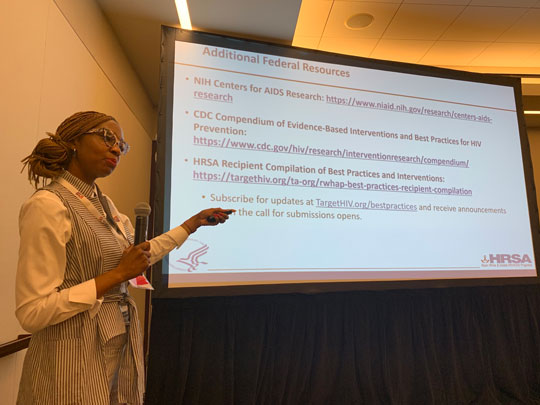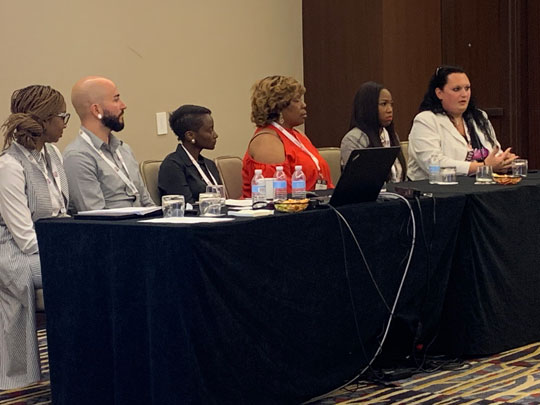HRSA Pathway on Ending the HIV Epidemic at USCA 2019

Among the 100+ workshops at the 2019 U.S. Conference on AIDS (USCA), held September 5-8, 2019, in Washington, D.C., was a Health Resources and Services Administration (HRSA) PathwayExit Disclaimer to outline—and hear—new directions in implementing the U.S. Department of Health and Human Services’ (HHS) Ending the HIV Epidemic: A Plan for America. This ambitious goal can be achieved over the next 10 years if the nation reaches fewer than 3,000 new HIV infections per year by 2030.
The overarching theme of the HRSA Pathway was to rapidly implement the initiative by building on the existing infrastructures and successes of two of the 90+ HRSA programs—the Ryan White HIV/AIDS Program (RWHAP) and HRSA-funded Health Center Program.
The most time-sensitive action is for the focus jurisdictionsExit Disclaimer to apply for funding and to plan to utilize these resources in innovative ways to reach people newly diagnosed with HIV, people with HIV who are not engaged in HIV care, and people with HIV who are in care but have not reached viral suppression.
Dr. Cheever encouraged the 57 jurisdictions to apply by the October 15 deadline to get their foot in the door for the anticipated five-year Parts A and B EHE funding cycle.
It is a five-year commitment, and I think in future years the amount of funding available will increase dramatically. So it's really important people apply this year to get into that five-year period rather than have to wait until the next opportunity in 2024.
Laura Cheever, MD, ScM, Associate Administrator for the HIV/AIDS Bureau, HRSA
Simultaneously, HRSA is also funding technical assistance and systems coordination providersExit Disclaimer to work with jurisdictions on their efforts.
Pathway ideas, from presenters and participants, focused on ways to achieve progress through community engagement, which has long been integral to both programs, and to implement proven interventions and test new ideas generated by targeted jurisdictions. Such innovation is anticipated, and necessary, to fill gaps and determine how to reach the very hardest-to-reach populations. Below is a broad overview of each session, presented by HRSA RWHAP and HRSA-funded Health Center Program staff, along with HRSA-funded technical assistance projects and front-line community staff. Listening session feedback is being studied by HRSA for follow-up. Read the slides for more details.
- Session 1: Building on HRSA Programs’ Infrastructure Supporting Ending the HIV Epidemic
HRSA staff outlined ongoing coordination and leadership across HHS agencies to achieve the goals of the Ending the HIV Epidemic: A Plan for America. Early HRSA-focused implementation steps build on current HRSA HIV/AIDS programs under RWHAP Parts A and B and Health Center Programs that also receive RWHAP funding. Opportunities for innovation abound at the federal and community levels. Examples include expanded community engagement like involving Health Centers in RWHAP planning; implementing the flexibility afforded to RWHAP recipients under HRSA’s PCN16-02, Ryan White HIV/AIDS Program Services: Eligible Individuals and Allowable Uses of Funds; or implementing promising practices previously identified by Health Centers.
See the slides: Building on HRSA Programs’ Infrastructure Supporting Ending the HIV EpidemicExit Disclaimer [PDF, 3.0MB].
- Session 2: Community Engagement and Involvement of People with HIV
In the session, HRSA staff reviewed the history and importance of community input in HRSA’s programs, both the RWHAP and Health Centers. A panel of HRSA projects that build consumer capacity presented during this session, including Building Leaders of Color Living with HIVExit Disclaimer (BLOC); training of consumers on quality improvementExit Disclaimer in HIV care delivery (CQII); community engagement in the development of integrated care/prevention plansExit Disclaimer; and a project that trains and utilizes community health workersExit Disclaimer in delivery of HIV care.
See the slides: Community Engagement and Involvement of People with HIVExit Disclaimer [PDF, 3.0MB].
- Session 3: Ending the HIV Epidemic with Implementation Science in HRSA’s RWHAP

Presenters summarized HRSA’s work on developing a framework for evaluation and use of proven intervention strategies. These efforts build on decades of RWHAP development of innovative models and evaluation, primarily through its Special Projects of National Significance (SPNS) Program and have been further refined by a Federal Implementation Science Workgroup of HHS agencies. The Implementation Science approach includes categorization of interventions, based on different levels of evidence and advancement of knowledge: Evidence-based, Evidence-informed, and Emerging Strategies. Rapid implementation of interventions is necessary to meet EHE initiative goals and begins with identifying gaps, interventions to address them, and packaging, evaluating, and disseminating intervention materials. An upcoming RWHAP Best Practices CompilationExit Disclaimer will house the full range of evidence-driven interventions with an online portal for agencies to submit their emerging strategies for scoring review and possible future national dissemination. This session wrapped up with insights from various RWHAP recipients that are using Implementation Science, including Dissemination of Evidence-Informed Interventions (DEII)Exit Disclaimer and E2i: Using Evidence-Informed Interventions to Improve Health Outcomes among People Living with HIVExit Disclaimer. They are just a sampling of replication resourcesExit Disclaimer currently available.
See the slides: Ending the HIV Epidemic with Implementation ScienceExit Disclaimer [PDF, 2.9MB].
- Session 4: The Ending the HIV Epidemic Listening Session
This session was open mic time for front-line programs to provide insights leading up to implementation of the initiative. Dozens of observations were shared, such as enhanced training and support for community health workers and other peer workers. HRSA appreciated the feedback received at the session, and the door is still open to share even more ideas at EndingHIVEpidemic@hrsa.gov.
See the slides: Ending the HIV Epidemic Listening SessionExit Disclaimer [PDF, 303KB].
Dr. Cheever participated in a live video conversation from USCA with her CDC counterpart, Dr. Eugene McCray. Watch their discussion about their agencies’ roles in the Ending the HIV Epidemic initiative and more.